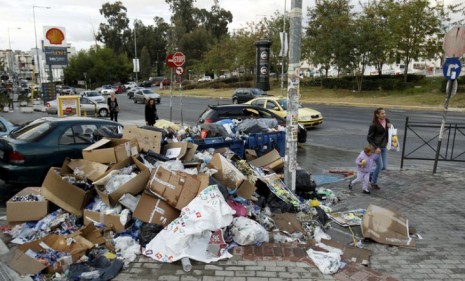Greece's austerity-driven health crisis
Cuts in spending on hospitals and social welfare programs have put health care out of reach for many Greeks

A free daily email with the biggest news stories of the day – and the best features from TheWeek.com
You are now subscribed
Your newsletter sign-up was successful
Greece's debt crisis isn't just making its citizens mad — it's literally making them sick, according to a report in British medical journal The Lancet. Here's what you should know:
What kind of health problems are on the rise?
All kinds. The number of people reporting general "bad" health has climbed sharply. New HIV infections are expected to rise by 52 percent in 2011. Half of those new infections are expected to be related to a dramatic jump in intravenous drug use. And suicides rose by 25 percent in 2010 over the previous year, according to unofficial statistics.
The Week
Escape your echo chamber. Get the facts behind the news, plus analysis from multiple perspectives.

Sign up for The Week's Free Newsletters
From our morning news briefing to a weekly Good News Newsletter, get the best of The Week delivered directly to your inbox.
From our morning news briefing to a weekly Good News Newsletter, get the best of The Week delivered directly to your inbox.
How is government debt linked to these health problems?
As Greece imposes austerity measures to keep from drowning under its debt, hospital workers have walked out to protest staff cuts. Garbage collectors have been on strike for a week, leaving trash heaps to pile up around Athens. And stress levels are rising for everybody. Plus, the Greek government has slashed spending on hospitals, welfare programs, and just about everything else to avoid defaulting on its debts. Among the cuts: Public hospitals have seen their funding reduced by as much as 40 percent, leaving them short on staff and supplies, even as admissions rose by 24 percent in 2010.
Are hospitals overwhelmed?
Public hospitals are. The economic crisis has left fewer people able to pay for private care. Private hospital admissions have fallen by as much as 30 percent, and patients are instead flooding into public health-care facilities. There are even reports of "bribes given to medical staff to jump queues in overstretched hospitals," the authors of the study in The Lancet wrote. Many Greeks are resorting to visiting street clinics run by humanitarian groups, such as Doctors without Borders, which used to almost exclusively serve low-income immigrants.
A free daily email with the biggest news stories of the day – and the best features from TheWeek.com
Sources: The Lancet, AFP, Huff. Post, BBC News
-
 The environmental cost of GLP-1s
The environmental cost of GLP-1sThe explainer Producing the drugs is a dirty process
-
 Greenland’s capital becomes ground zero for the country’s diplomatic straits
Greenland’s capital becomes ground zero for the country’s diplomatic straitsIN THE SPOTLIGHT A flurry of new consular activity in Nuuk shows how important Greenland has become to Europeans’ anxiety about American imperialism
-
 ‘This is something that happens all too often’
‘This is something that happens all too often’Instant Opinion Opinion, comment and editorials of the day